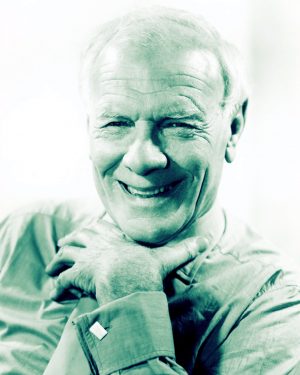Is TV doing God any good?
Cabinet ministers have called for more politics on TV. Grumpy critic Milton Shulman says what we need is less Christianity

For a moment, at least, there is an uneasy hush about the question of politicians and TV.
Having been hit by the verbal blunderbusses of two Cabinet Ministers – Richard Crossman and Anthony Wedgwood Benn – charging them with trivialising the political scene, the TV executives are brooding about the accusation and, as yet, doing nothing about it.
Now, in his Granada lecture Richard Crossman asked why the minority of people interested in politics should be given less TV time than minority groups interested in sport, music, drama or religion.
He estimated that the minority really keen on politics would be “far more numerous than all the opera-goers and the balletomanes put together, and at least as numerous as the active Christians.”
“Sixty minutes a week of straight outside broadcasting would seem a lot to us,” he said, pointing out that this was the time allotted to all-in wrestling.
Privileged

But what Mr Crossman failed to ask himself, and what few politicians are prepared to face, is whether or not any serious or concerned aspect of man’s activities can hope to benefit by increased support or respect if it becomes a recognised and accepted ingredient of a medium which is itself fundamentally trivial.
Tie one sector of our communal life that TV has continually given a privileged position in terms of hours has been the Christian churches.
Although the Postmaster-General does not have much say in the programme content of either the ITA or the BBC. he does insist that the hours between 6.15 p.m. and 7.25 p.m. on Sundays should be confined to a limited category of broadcasts (religious, charitable, Welsh language, those for the deaf) and which, in practice, has meant a quarantined zone largely occupied by religious TV. In addition to this hour and 10 minutes of privileged time, the ITV usually provides about 35 minutes a week of religious chat in what used to be the Epilogue slot and the BBC has a half-hour repeat of one of its Sunday religious programmes late the same night.
Definition
In other words, over three hours every week are granted, almost as a right, to Christian churches to put over their message and philosophy on TV. No other serious institution — Parliament, the Monarchy, the City, the Press, the Universities, the Law, the medical profession — is granted a fraction of this time to say what they would like to say to the public.
The definition of what is a religious broadcast is almost exclusively decided by the Central Religious Advisory Committee which advises the ITA and the BBC on these matters
On this Advisory Committee, which was established by Lord Reith – the BBC’s first Director-General — there are no minority religious groups or non-Christians. It represents exclusively the “mainstream of Christian tradition.”
The Chief Rabbi, in a recent letter to the Times, pointed out that the Jewish community receives but a fraction of its proportional share in religious broadcasting time based on the ratio of Jewish citizens.
And a number of MPs have also written to Lord Hill at the BBC complaining about the fact that the humanist position does not get its fair share of representation on the box.
Declining
But a more fundamental question than this volume of time each faith or interest gets on TV is whether or not there is any evidence that the constant exposure of Christianity on TV in its present context brings about a heightened awareness of Christianity and a rise in the number of its adherents and followers.
Judging by a Gallup Poll taken last year, there has been a serious increase in the number of people who believe that religion is losing its influence.
Compared to 1957 — which is a date that roughly corresponds to the advent of commercial TV on a popular scale and the consequent change in serious TV standards — there was an increase of some 17 per cent. in the number of people who thought religion was on the decline.
In 1957 52 per cent. of the people thought religion was losing its influence, in 1967, this had jumped to 67 per cent. In 1957, 17 per cent. thought religion was increasing its influence; in 1967 only 9 per cent. felt its significance was greater.
It is interesting, too, that it was members of the Church of England — the faith that gets the biggest slice of the TV religious cake — who provided the largest number of those who felt religion was losing its influence.
On the other hand, if we examine the records of the Jews and Humanists — groups who are concerned about their lack of access to the box — we will find no such precipitate decline in the over-all adherence to the importance of their beliefs.
The number of recognised Jews in Britain has remained relatively static — around the 450,000 mark — in the post-war years. The Humanists, on the other hand, are galloping ahead with membership in the Humanist Association – although tiny — increasing by some 20 per cent. per year.
No one would try to deduct from these figures a generalisation that TV is chiefly responsible for a fall in churchgoing or a decline in Christianity. Other factors — materialism, science, permissiveness, scepticism have made their impact. But why, for example, have these factors left the Jews relatively untouched?
TV, being the mysterious, unknown quantity that it still is, could be having its effect.
Commercial?
Isn’t there an element of the concealed commercial about many religious unobtrusive priest trying to make some sort of subliminal impact in a discussion on pop music or sex — which puts viewers in mind of TV advertising films and therefore stimulates their most intense defensive and cynical responses?
Judging by the surreptitious disguises now being used to flavour religious programmes with a secular masquerade, it appears that there is a growing doubt about the value of straight forward Christian programmes attempting to reason or proselytise or argue directly from the small screen.
Series such as Malcolm Muggeridge’s The Question Why and the current series on London Weekend, Round House, which is a sort of Speaker’s Corner on current affairs, are only peripherally religious and almost make nonsense of the Postmaster-General’s edict that these Sunday night slots should be devoted to religious programmes.



